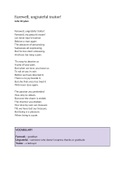Summary
Summary Poem Analysis of 'Farewell, ungrateful traitor' by John Dryden
Here’s a full analysis of the poem ‘Farewell, ungrateful traitor’ by John Dryden, tailored towards A-Level students but also suitable for those studying at a higher level. Includes: POEM VOCABULARY STORY / SUMMARY SPEAKER / VOICE LANGUAGE FEATURES STRUCTURE / FORM CONTEXT ATTITUD...
[Show more]








